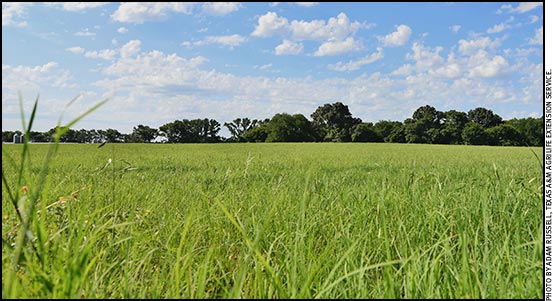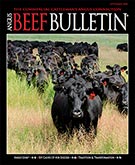
A Coastal Bermuda grass field in East Texas.
Bermuda Grass 101
Choosing the right variety starts with personal preference and geographic region.
Not all Bermuda grasses are created equal, and varieties are often confused as their own separate species, said a Texas A&M AgriLife Extension Service expert.
Vanessa Corriher-Olson, AgriLife Extension forage specialist, Overton, Texas, said she receives numerous calls each year regarding Bermuda grasses by producers who are confused about warm-season grass species and looking for the right fit for their location.
Bermuda grass is a warm-season perennial grass that spreads mainly via underground stems, or rhizomes, and horizontal aboveground stems, or stolons, she said. The grass tolerates a wide range of soil types and soil pH levels, making it adaptable to most of the southern United States.
“Most people think these Bermuda grass varieties are a species of their own, but they are not,” Corriher-Olson said. “They are hybrid varieties of Bermuda grass.”
Here are some of the grasses she said are commonly confused, along with a description of them.
Coastal: Modern Coastal Bermuda grass is a result of an extensive breeding program by Glenn Burton, a USDA plant geneticist and grass breeder at the University of Georgia Coastal Plains Experiment Station at Tifton, Ga.
Coastal, the most widely planted variety in Texas, is a highly productive Bermuda grass producing both rhizomes and stolons and is adapted to a wide range of climatic conditions, Corriher-Olson said. The variety has exceptional longevity, readily responds to fertilizer and irrigation, and possesses better drought tolerance than common Bermuda grass. Coastal is also tolerant of continuous grazing or frequent and close defoliation.
“Many Bermuda grass cultivars have the ability to tolerate sustained close grazing when soil fertility and moisture levels are met,” she said.
Tifton 85: This variety was developed by Burton in cooperation with the Tifton station in 1991. Tifton 85 is a hybrid between Coastal and Tifton 68. Tifton 85 has large stems, long stolons and a reduced number of rhizomes compared with Coastal. It can be established either by planting sprigs or vegetative tops, Corriher-Olson said.
In a three-year trial in Georgia, Tifton 85 produced 26% more dry matter and was 11% more digestible than Coastal. Animal gains were approximately 10% better on Tifton 85 than Coastal due to the higher digestibility.
During trials at the Texas A&M AgriLife Research and Extension Center in Overton, Tifton 85 remained green longer into the season than Coastal, she said.
“During the 2011 drought, we visually saw Coastal go dormant before Tifton 85,” she said. “But overall, Bermuda grasses are more drought tolerant than Bahia grass.”
Jiggs: This variety is a private release of a Bermuda grass found growing along the Texas Gulf Coast. Jiggs establishes rapidly and is generally planted using tops, Corriher-Olson said.
The naturalized ecotype is productive and anecdotal evidence suggests Jiggs may perform better on poorly draining, tighter soils than other Bermuda grass varieties.
“There is no difference in dry-matter yields between Jiggs and Coastal,” she said. “There is very little information available regarding Jiggs, but the variety has generated a good following where it is used.”
Corriher-Olson said choosing a Bermuda grass variety based on location is the most important consideration.
“For the most part, a producer’s choice is personal preference because Bermuda grasses are so well adapted to conditions in Texas for grazing and hay production,” she said. “But some hybrid varieties are better suited for specific regional conditions.”
For more information about Bermuda grass varieties and other forage-related topics, go to https://foragefax.tamu.edu/. Producers who are not sure which variety is best for their location and production system can visit with a local AgriLife Extension agent for region-specific recommendations.

Editor’s Note: Adam Russell is a communications specialist with Texas AgriLife Extension Communications.






